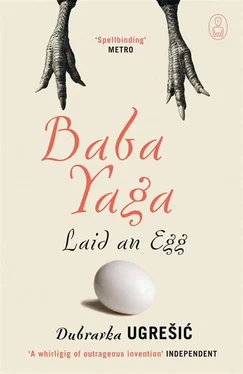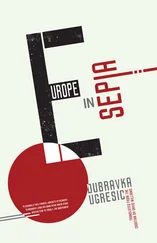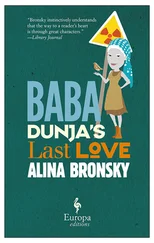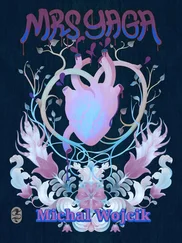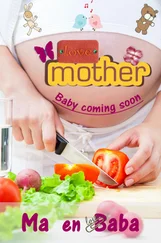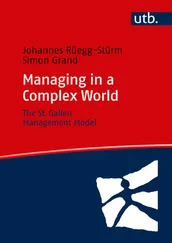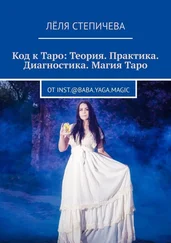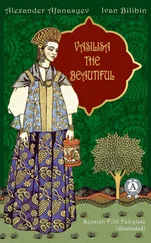As soon as Kukla opened the suite door, the child’s gaze was drawn to Pupa’s fur boot, as though to a magnet. The boot had stood there since the hotel staff brought it back from dry cleaning. To start with the little girl just looked at the boot in wonder, then she went cautiously up to it and peered in. Slowly she raised one foot, then the other, and stepped into the boot. At first she stood in the boot, looking all around her, and then she slipped deftly into it and sat down, without letting her puppy out of her embrace.
‘Are you hungry?’ asked Kukla.
The child shook her head.
‘Thirsty?’
‘Umm…’ replied the child non-committally.
‘You’re not thirsty?’
The child shook her head again.
Kukla was a little embarrassed. Looking after small children was evidently not her greatest talent. The child peeped out of the boot, tensely following Kukla’s every move. Kukla sat down wearily on the edge of the bed and gazed at the little girl.
‘What am I going to do with you?’ she asked.
The child raised her shoulders and let them fall.
‘Do you like the boot?’
‘Aha…’
‘My friend used that boot to keep her feet warm,’ said Kukla, because she didn’t know what else to say.
The child stared at Kukla without stirring.
‘Her name was Pupa.’
‘Apup saw eman reh,’ said the child.
Kukla gaped at the little girl: that was not Chinese, for sure. The child watched her blithely, knowing that she had attracted Kukla’s attention.
‘Pupa,’ repeated Kukla.
‘Apup!’ said the little girl.
‘Kukla.’
‘Alkuk,’ said the child.
No, it’s not possible! thought Kukla. The little girl is far too bright for her years, no adult is capable of playing with words like that at such speed. Kukla shuddered. What if reversing words was the symptom of some serious illness?
‘Mum makes lunch, Dad reads the paper,’ said Kukla, knowing that what she was saying was stupid, but it was the first thing that occurred to her.
‘Mumdad makes lunch and reads the paper!’ said the little girl.
‘Who’s Mumdad?’ asked Kukla surprised.
‘Filip,’ said the little girl and drew herself into the boot.
* * *
There was a silence. Again, Kukla did not know what to say.
‘What are you doing in that boot?’ she asked after a while.
The little girl said nothing.
‘Where are you? I can’t see you.’
‘I can see you,’ said the little girl.
‘You’re like a mouse… Like a mouse in a slab of cheese doing just what you please.’
‘I’m a little girl.’
‘Come on, then, get out of that boot.’
‘I can’t.’
‘What are you doing in there?’
‘I’m flying,’ said the little girl.
‘Floating, more like,’ Kukla corrected her.
‘Flying, more like,’ said the child.
Good heavens, thought Kukla in surprise. She had no experience whatever of children, admittedly, but it seemed to her that little girls of four did not talk quite like this.
‘Hey, come out of there a minute, I want to ask you something.’
‘What?’ asked the little girl, but she did not poke her head out.
‘Do you know what two plus two makes?’
Out of the boot poked the little girl’s hand, showing four fingers.
‘And how old are you?’
The little girl showed four fingers again.
‘What about you?’ came a little voice from the boot.
Kukla stood up, found a piece of paper and a pencil, wrote a large figure 80 on the paper and turned it towards the child.
‘Come out and I’ll show you!’ said Kukla.
The child peered out.
‘Eighty!’ she said.
‘Not quite, actually, I’ll be eighty in December.’
‘You’re twenty times older than me,’ said the little girl.
‘Which makes you twenty times younger than me,’ said Kukla.
Kukla was alarmed again. She wondered whether the little girl was not too clever for her years. She would have to talk to Beba. Poor Beba, she must be lying in her room in despair. David was inaccessible. You couldn’t ask him anything. He was rushing about sorting out Pupa’s affairs.
‘Listen, little one, what would you say to the two of us ordering something sweet from the cake shop?’
The little girl poked her head out of the boot and nodded.
‘Ice cream or cakes?’
‘The first,’ said the little girl.
Kukla felt better. She was a child after all. A dear, sweet little girl…
‘What about Toto?’
‘Who’s Toto?’ asked Kukla in surprise.
Wawa pointed at the puppy.
‘Hmm… OK, let’s go for a walk; we’ll buy some dog biscuits for Toto, and the two of us will find somewhere to sit and have an ice cream. How about that?’
The little girl clambered out of the boot and cheerfully held her hand out to Kukla. Kukla noticed that the little girl had dark eyebrows, almost touching in the middle. On her round face they looked like a child’s drawing of a bird in flight.
Everything had fallen apart, as though the cupboard in her little office in the medical faculty had burst open. The office was where she had spent her whole life drawing sketches that no one needed any more, and now those sketches, rolled up in dusty bundles, had tumbled out of the cupboard and unfurled like little rugs. Fragments scampered in front of Beba’s eyes: bones, muscles, nerves, the nervous system, cells, reproductive organs, the urinary tract, the cardiovascular system, the heart, veins, arteries, the liver, ears, the auricular canal, the spleen, stomach, intestines, large and small, the rectum, anus, lungs, windpipe, oesophagus, the eye… That was Beba’s field, Beba’s Guernica. And in that paper snowstorm a lost child wandered, Beba’s son.
Yes, Beba had a son, Filip. He had inherited her talent for drawing, and as soon as he graduated from the Academy, he had gone abroad: Italy, France and London. That was where he met his partner (‘partner?’ What a clumsy word!). According to David, at a certain moment Filip had wanted a child; he had gone rushing about, investing all his time and energy in the business of adopting one. Finally, he got lucky, and they, Filip and his partner, succeeded in adopting a little girl who was just a few months old. But then Filip began to obsess about what would become of the child if anything happened to him. And he would not rest until he had drawn up a will with David’s help, according to which, in the event of his death, Beba would take over care of the child. When Filip died of Aids, exactly what he had foreseen occurred. His partner left the little girl to David, collected all Filip’s paintings and disappeared. That was all Beba managed to glean from David. But she would ask, she would try to find out. Because ever since he left home, Filip had rarely been in touch. The occasional letter, more often a postcard, just to let her know he was alive. He had never given any address. He had never contacted his father. In truth, he had no reason to. His biological father had never shown any interest in him, and if he had done, there would have been a scene as soon as he learned of Filip’s inclinations.
It was all her fault, of course, and it would not have been right to blame his father. Because she was the one who had pushed the unfortunate father to one side, proclaiming him ‘biological’, and then ‘hypothetical’, in order to have Filip to herself. Yes, her passion had drawn misfortune in its wake. God, now that she thought about it, she had bought him clothes as though she was his lover, rather than his mother. When he was little, she had dressed him like a doll, and then, when he grew up, like the lover she had never managed to acquire. When he was not at home, she sometimes went to his little room and stood for a long time in the doorway, breathing in his smell. It was her fault. And when he left, she had spent days dreaming of his return. Yes, she had wanted him all to herself, and had only pretended that that was not the case. She concealed her feelings, she acted, she did all she could not to suffocate him. She went out with men, pretending to have her own life, to be an independent woman who lived life to the full and did not care about anything else. But still, love seeped out of her and, like the foam putty used to fit window-panes, it filled all her cracks, pores and openings. She could not deceive him, it was impossible to breathe: the air in their apartment was just too dense. She followed him like a dog, arousing first his pity, and then his revulsion.
Читать дальше
